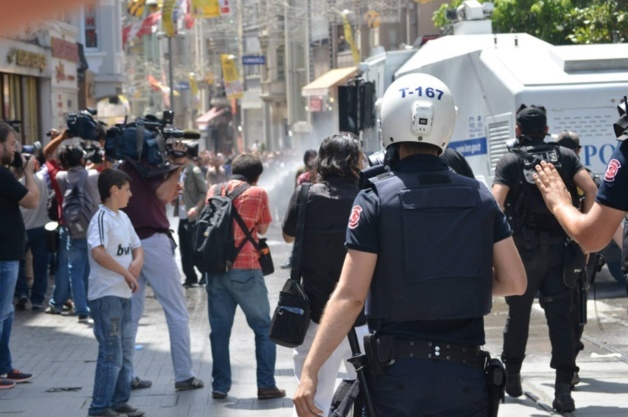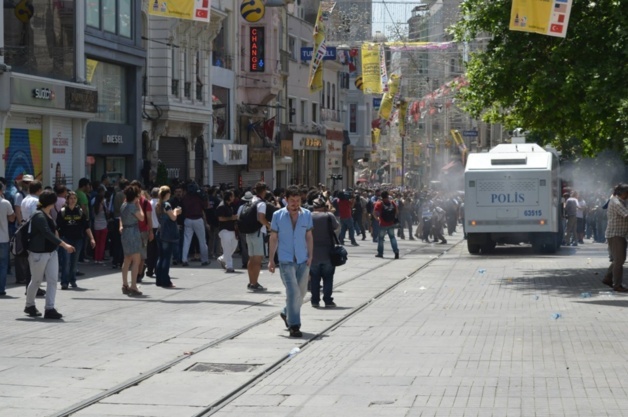
Picture taken by Laurène Perrussel
Istanbul, May 31st, 2012: on Istiklal Caddesi, an avenue of the modern city centre, a protester read the Turkish Constitution to police officers who had just blindly charged at the crowd who joined together there. Moments later, he along with 10,000 other protesters were charged at once again and gassed by those very law enforcement agents. What was once a rallying to protect Taksim Park, as it was threatened by destruction, “Occupy Gezi Park” henceforth reveals greater issues at hand.
Police brutality targeted
Istanbul youth clashes with law enforcement on the regular. They were already denied access to Taksim square as of the 1st of May on account of work being carried out—work, that is now the main reason why youths are taking to the streets. Conflict has arisen with the organization of demonstrations. In the early mornings of the past few days police have been increasingly violent in their attempts to drive protesters out of Gezi Park where they have been camping out in an effort to protect the 600 trees threatened by the impending work.
The events of the 31st of May have caused several victims, many with fractures and respiratory distress. Among the victims is CHP (Republican People’s Party, kemalist) member, Sirri Süreyya Önder, who was rushed to hospital after being hit in the shoulder by a tear gas grenade. A protester suffering from hypertension passed away due to a heart attack after being exposed to the very same tear gas. There has been strong support for the protesters via social media and as of this evening, the dispute has begun to stretch out to the capital, Ankara, and the city of Izmir.
The events of the 31st of May have caused several victims, many with fractures and respiratory distress. Among the victims is CHP (Republican People’s Party, kemalist) member, Sirri Süreyya Önder, who was rushed to hospital after being hit in the shoulder by a tear gas grenade. A protester suffering from hypertension passed away due to a heart attack after being exposed to the very same tear gas. There has been strong support for the protesters via social media and as of this evening, the dispute has begun to stretch out to the capital, Ankara, and the city of Izmir.
Secularism at risk
The protests have come about in a state of political tension. Turkish rights are progressively being disregarded. A law limiting the sale of alcohol and advertisement for alcoholic beverages was voted on last Friday, May 24th. Several have seen this as a risk for secularism, which is one of the founding principals of the Kemal Republic. Meanwhile, Prime Minister Recep Tayyip Erdoğan, defended the law in the name of public health. A study carried out by Turk-Stat (the Turkish Institute of Statistics) shows that 85% of the population does not drink.
In February of 2012, Erdoğan made his intentions clear by declaring before members of parliament his desire to “create a religious youth” that would coincide with the “values and principles of [the] nation”. In response to the criticism he received, the Prime Minister stated: “Do you wish the Conservative Party and the democratic AKP [Justice and Development Party] create a generation of atheists? Perhaps that is your concern, your mission, but it is not ours. You don’t want religious youths, so do you want them to be drug-addicts?”
In February of 2012, Erdoğan made his intentions clear by declaring before members of parliament his desire to “create a religious youth” that would coincide with the “values and principles of [the] nation”. In response to the criticism he received, the Prime Minister stated: “Do you wish the Conservative Party and the democratic AKP [Justice and Development Party] create a generation of atheists? Perhaps that is your concern, your mission, but it is not ours. You don’t want religious youths, so do you want them to be drug-addicts?”
Opposing forces silenced

In the last ten years, the army, who traditionally preserved secularism in the Kemal Republic, has weakened due to the Ergenekon affair, which saw the rise of an alleged criminal network that aimed to overthrow the AKP in 2003. Certain Turkish political movements such as the CHP confirm that the affair is but a pretext to silence the army, known traditionally as a bulwark against Islamism. According to opposing forces, these measures are an integral part of the government’s “hidden agenda”. In an electoral campaign speech made during the 2011 municipal elections, the CHP accused Erdoğan’s AKP of equipping itself with a plan that would facilitate the monopolizing of power after the elections.
Freedom of the press is utopic in Turkey. The journalists covering the demonstrations regularly fall victim to the violence that has been denounced by Reporters Without Borders. They call such violence “targeted attacks”. Since the first day of protests, there has been a cameraman who suffered a head injury and, on the 31st of May, Ahmet Sik, an independent journalist, was hit by a tear gas grenade. Witnesses claim that the projectile, which was thrown from about 10 meters away (just under 33 feet), was aimed at the journalist.
Jennifer Psaki, a spokesperson for the U.S. Department of State, called for order in Ankara. “We are concerned about the number of people injured in the dispersing of protesters by police officers in Istanbul”, she declared, while asking Turkey to, “respect the rights of freedom of expression, association and gathering such as those people were clearly practicing”.
Where his European counterparts with whom he is close are Christian democrats, Erdoğan is a practicing Muslim who doesn’t smoke or drink and that presents himself as a “conservative democrat” or a “Muslim democrat”. With the income per capita having tripled since the AKP came to power in 2002, the party remains very popular among the most conservative groups of the population and is still very likely to be re-elected next year.
Freedom of the press is utopic in Turkey. The journalists covering the demonstrations regularly fall victim to the violence that has been denounced by Reporters Without Borders. They call such violence “targeted attacks”. Since the first day of protests, there has been a cameraman who suffered a head injury and, on the 31st of May, Ahmet Sik, an independent journalist, was hit by a tear gas grenade. Witnesses claim that the projectile, which was thrown from about 10 meters away (just under 33 feet), was aimed at the journalist.
Jennifer Psaki, a spokesperson for the U.S. Department of State, called for order in Ankara. “We are concerned about the number of people injured in the dispersing of protesters by police officers in Istanbul”, she declared, while asking Turkey to, “respect the rights of freedom of expression, association and gathering such as those people were clearly practicing”.
Where his European counterparts with whom he is close are Christian democrats, Erdoğan is a practicing Muslim who doesn’t smoke or drink and that presents himself as a “conservative democrat” or a “Muslim democrat”. With the income per capita having tripled since the AKP came to power in 2002, the party remains very popular among the most conservative groups of the population and is still very likely to be re-elected next year.



























